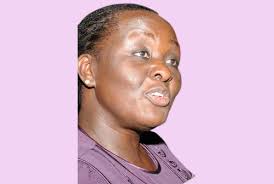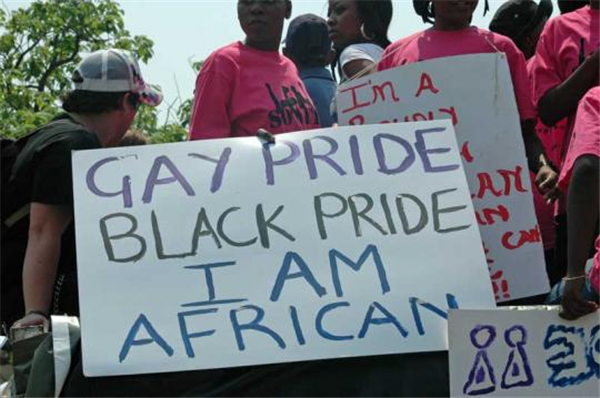
Sylvia Tamale
The Rev. Gideon B. Byamagusha is a person of courage, a person of the hearts of hearts. Byamagusha is an Anglican priest in Uganda, in a parish outside of Kampala. In 1992, Byamagusha announced that he was living with HIV. He was the first African religious leader to do so. In 2003 he founded the African Network of Religious Leaders living with or personally affected by HIV/AIDS, or ANERELA. By the end of 2006, ANERELA numbered over 2000 members in 39 African countries. In 2006, Rev. Byamagusha started a shelter for AIDS orphans. In May of this year, Rev. Byamagusha was awarded the Niwano Peace Prize. He lives today with his wife and three children.
He lives today, and in today’s edition of the Sunday Monitor, he writes: “No one really knows how many homosexuals , tri-sexuals, bi-sexuals, hetero-sexuals and non-sexuals we are in Uganda. What is known is that these sexualities are certainly not new ways of life.”
We are … homosexuals, tri-sexuals, bi-sexuals, hetero-sexuals and non-sexuals. We are.
On Thursday, November 19, Los Angeles County reported a 21% increase in crimes against gay, lesbian, bisexuals and transgendered people. The report noted that sexual-orientation hate crimes were more likely to be more violent than hate crimes based on racism or religious hatred.
Friday, November 20, marked the eleventh Annual International Transgender Day of Remembrance. The Transgender Day of Remembrance began in 1999, to commemorate, mourn, and protest the 1998 murder of Rita Hester, a transgender woman of color in Boston
Last year, in Yeoville, a neighborhood of Johannesburg, South Africa, Daisy Dube was brutally murdered, shot, when she and her friends asked three men in an car to stop calling them “isitabane”, a Sepedi slur against LGBT people.
A little over a week ago, on November 13, in Puerto Rico, 19-year-old Jorge Steven López-Mercado, was killed, beheaded, dismembered, and his remains were set on fire, because he was a man dressed in woman’s clothing.
Tara Sawyer sees November 20 as “an opportunity for all of us to stand up to end violence against all women….Some counts have the average number of murders of transgendered people at 19 per month! Or put another way, 1 in 12 of us in America will be murdered. But we as transgendered people are the only ones counting, in pretty much every country across the world. I’m a transgendered sex worker, and I want to not get killed for who I am or what I do. As our death count rises, I beg that you consider your prejudices around gender, and let us live in peace. I’m literally begging for my life.”
We are the only ones counting. Let us live in peace. I’m literally begging for my life.
In Uganda, homosexuality was already criminalized, and that was not enough. A new bill proposes death. Remember, sexual orientation crimes are likely to be the most violent, especially when perpetrated by the State, by Society, by Large Structures. The people must be protected, Society must be defended, the Nation must be preserved. Gay, lesbian, bisexual, transgender people must learn to die, must learn to beg for life … and then die.
Die … or dialogue? On Wednesday, Makerere University hosted a public dialogue between Sylvia Tamale, well-known human rights, women’s rights, sexual minorities rights’ feminist lawyer, and Maj. Rubaramira Ruranga, Executive Director of the National Guidance and Empowerment Network of people living with HIV/Aids in Uganda. Major Ruranga has been living openly with HIV since he announced his HIV status on World Aids Day, 1993. Before his promotion to his current rank, he was known as Captain Condom. There are many courageous people in Uganda.
Tamale opened her remarks with an invocation to dialogue: “I would like to thank the Human Rights and Peace Centre for inviting me here this afternoon to share my views on this bill. It is great that HURIPEC organized this to be a dialogue and not a debate because debates have a tendency to polarize and divide along irrational gut-level responses. A dialogue, on the other hand, usefully sets the stage for people to listen to each other with understanding, tolerance and helps build bridges. I hope that this public dialogue will mark the first stepping stone for all of us to embark on a rewarding journey of mutual respect, simple decency and fairness.”
Stepping stones or stones of violence? It is not enough to put down the stones. Something must be built, an open bridge, an open road, an open and shared journey.
She concluded her remarks with an oblique return to the theme of dialogue: “Do we really in our hearts of hearts want our country to be the first on the continent to demand that mothers spy on their children, that teachers refuse to talk about what is, after all, “out there” and that our gay and lesbian citizens are systematically and legally terrorized into suicide? Ladies and gentlemen, you may strongly disagree with the phenomenon of same-sex erotics; you may be repulsed by what you imagine homosexuals do behind their bedroom doors; you may think that all homosexuals deserve to burn in hell. However, it is quite clear that this Bill will cause more problems around the issue of homosexuality than it will solve. I suggest that Hon. Bahati’s bill be quietly forgotten. It is no more or less than an embarrassment to our intelligence, our sense of justice and our hearts.”
What is in our hearts? Justice? Love? Who is counting our deaths, who is opening our spaces, who is charting our journey? Who is in our hearts of hearts? Let us live in peace. I am literally begging for our lives. We are …
(Photo Credit: The Sunday Monitor)


